Biostar TPower i55 – Super Middle Weight Contender
by Rajinder Gill on November 25, 2009 12:00 PM EST- Posted in
- Motherboards
Networking
The Windows 2000 Driver Development Kit (DDK) includes a useful LAN testing utility called NTttcp. We used the NTttcp tool to test Ethernet throughput and the CPU utilization of the various Ethernet Controllers used on the Intel motherboards. We set up one machine as the server; in this test, an Intel system with an Intel CSA Gigabit LAN connection. Intel CSA has a reputation for providing fast throughput and is a logical choice for our Gigabit LAN server.
On the server side, we used the following Command Line as suggested by the VIA whitepaper on LAN testing:
Ntttcpr -m 4,0,‹server IP› -a 4 -l 256000 -n 30000
On the client side (the motherboard under test), we used the following Command Line:
Ntttcps -m 4,0,‹client IP› -a 4 -l 256000 -n 30000
At the conclusion of the test, we captured the throughput and CPU utilization figures from the client screen.
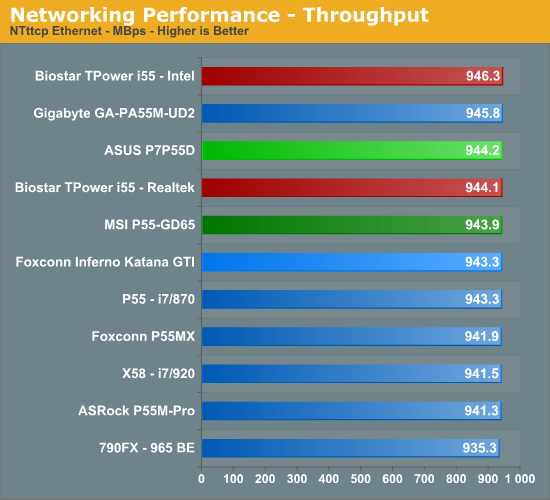
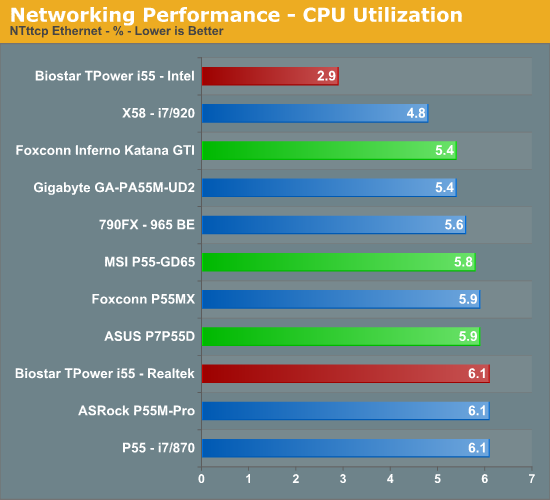
Our network throughput test indicates how well a particular controller design from Realtek, Marvell, or Intel performs instead of being indicative of true chipset performance. This also holds true for the CPU utilization results, though this test can also be influenced to certain degree by the BIOS code and chipset interconnect design.
The CPU utilization and throughput numbers favor the Intel controller on the Biostar board, followed closely by the Realtek chipsets on the other boards. In practice, few if any users will notice a difference, even if they have the requisite gigabit hub, as storage performance frequently bottlenecks the actual transfer rates. However, we applaud Biostar for using the Intel controller as it truly is the best controller available on any motherboard today.
For our second series of networking tests we utilize a Promise SmartStor NS4600 NAS unit equipped with two WD Caviar Black 640GB drives in RAID 1 operation. We are using two benchmarks from Intel’s popular NASPT 1.70 testing tool. The Promise NAS unit is connected to each test platform via a NetGear Gigabit Ethernet switch. We left all settings at their defaults on both the motherboard and Promise NAS unit. Our goal was to maximize the performance of the NAS unit to verify our network throughput capabilities on each motherboard.
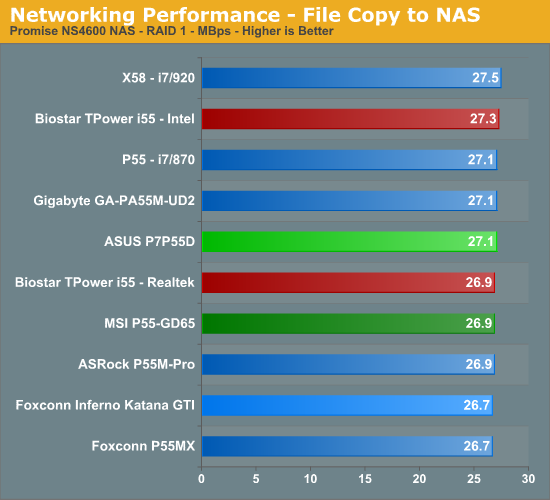
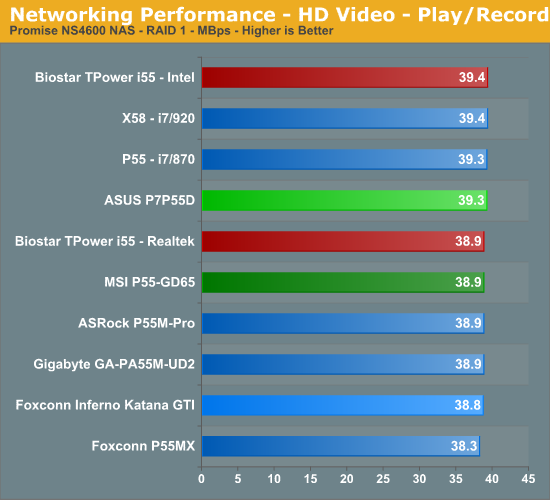
Our P55 test subjects perform almost identically in our actual usage tests with the Realtek chipsets, but the Biostar board has a slight advantage when using the Intel controller.
USB / FireWire Performance
Our USB transfer speed tests are conducted with an USB 2.0/FireWire based Lacie external hard drive unit featuring a 1TB 7200rpm Samsung drive. In the SSD to External test, we transfer a 3.82GB folder containing 2735 files of various sizes from our Kingston 80GB SSD to the Lacie drive. In the next two file tests, we use the same 3.82GB folder to transfer from our WD VRaptor 300GB hard drive to the external Lacie drive utilizing the USB 2.0 and IEEE 1394a interface.
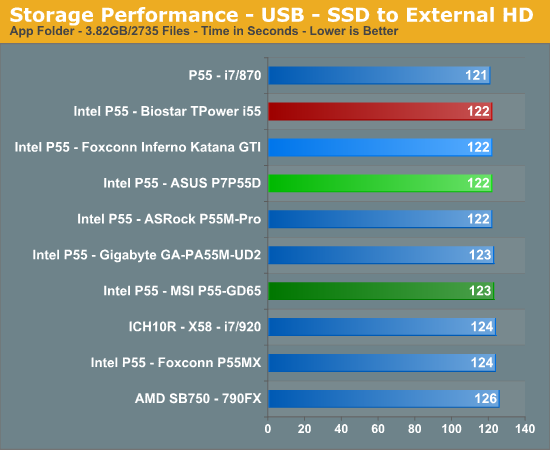
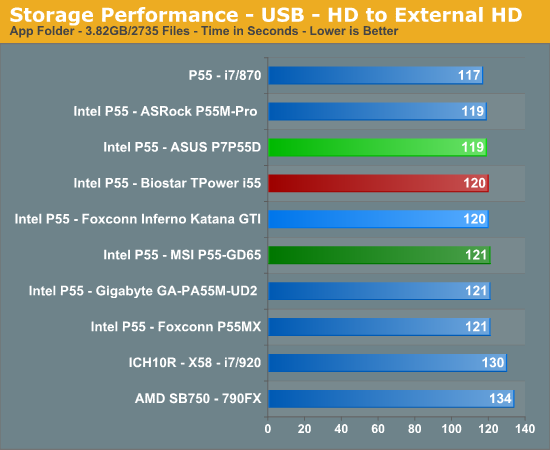
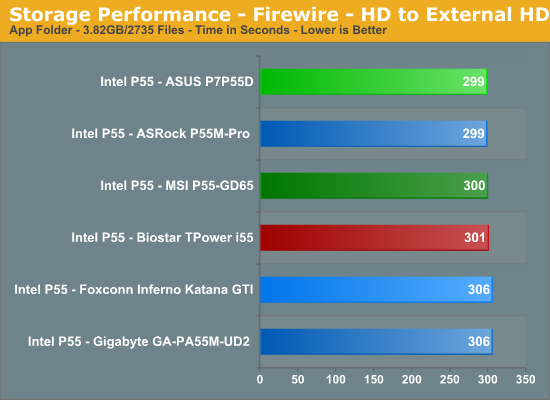
The Biostar board performs in the middle of the pack in our USB tests. The LSI Firewire controller on the Biostar board has a slightly higher write speed than the TI controllers on the Gigabyte/Foxconn boards, but is a little slower than the VIA controllers on the ASUS/MSI boards.
Storage Performance
In our storage test, we utilize the same 3.82GB test folder and transfer it from our WD VRaptor drive to our Kingston 80GB SSD.
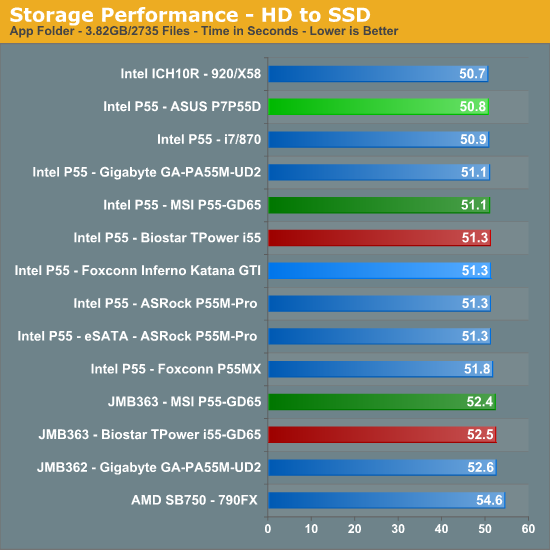
Once again, our P55 motherboards perform almost identically. The P55 chipset on the Biostar board has a 3% advantage over the JMicron controller on the same board. However, any measurable differences were not recognized in actual usage.










39 Comments
View All Comments
bccloth00998 - Friday, December 18, 2009 - link
http://www.bccloth.com">http://www.bccloth.comzengqunhai2 - Saturday, December 12, 2009 - link
www.find68.comChristmas sale, free shipping discounts are beautifully gift
Christmas is approaching, your Christmas gifts ready? wownicesales
mall for you, which involves a number of well-known brands from the
Asia-Pacific region the trend of merchandise. Promotional discounts
should be, come SHOPPING bar!
In order to meet the arrival of Christmas. Our company has been in
order to return the old customers of the Company for their support.
Overall direct sales business. Wholesale price of a rare opportunity.
You are still hesitant about. Chance only once.
Not to be missed.
(I)Our Company is Online store, and we vogu emalls offer top quality
sport shoes, famous brand shoes and sportswear at good price.
(II) I n the past 6 years, we have sent great many products to the
customers in USA, Europe, ASIA and other area, also we have lots of
experience in dealing with online business oversea
(III) Generally, Goods are delivered in fast and safety way Of
course, shoes and clothing will be packaged in original box with tags
www.find68.com
New to Hong Kong : Winter Dress
---**** NHL Jersey Woman $ 40 ---**** NFL Jersey $ 35
---**** NBA Jersey $ 34 ---**** MLB Jersey $ 35
---**** Jordan Six Ring_m $36 ---**** Air Yeezy_m $ 45
---**** T-Shirt_m $ 25 ---**** Jacket_m $ 36
---**** Hoody_m $ 50 ---**** Manicure Set $ 20 ... ...
granulated - Friday, December 4, 2009 - link
I want to know how why the AMD board murders the rest in two games when it's in it's more usual 'bringing up the rear' position in the rest.ta2 - Monday, November 30, 2009 - link
Seems like you've been using a pretty crappy i5 chip. For it to top out as 4.1GHz is incredibly bad. I manage 4GHz on a GA-P55-UD4 with ALL voltages at stock except VCore at 1.30V. You have not really pushed the BCLK on this board and for you to need 1.36V for 4.1GHz is pretty terrible. I consider myself a novice overclocker, but either you're using a very bad chip or this board isn't so hot."We could run our memory at DDR3-2152". This board is officially rated up to 2600MHz for memory... so we haven't even tried to get close to the spec speed.
Rajinder Gill - Tuesday, December 1, 2009 - link
It's an average 750 CPU. There are plenty out there that top out early.With regards to 2600 MHz memory, I don't know of any CPU's that can hold 2600MHz speeds fully application stable. That's a benchmarking claim for users who run processors with sub zero cooling or like to post suicide shots. This article is focused on daily PC use. A BCLK of 215 is perfectly respectable for everyday usage scenarios (especialy with S3 resume working).
later
Raja
lopri - Friday, November 27, 2009 - link
The board looks really awesome. I mean, the fact one of the main gripes is the lack of clear CMOS button in the rear I/O panel says a lot. I like that Biostar used the Intel ethernet PHY to take advantage of ICH10R's built-in network controller. So many times I see CPU usages going 20~30% when there is heavy network trafficking, and I wondered why my experiences are so different from what I see in the reviews. Granted different packets show different performance characteristics and anti-virus is probably half of that CPU load, but the CPU usage wasn't as severe on my BadAxe 2 (which I use for WHS) so I do believe the Intel NIC/PHY is superior to that of Realtek.Another welcome news is the flawless S3 functionality under overclocking, and I applaud it very, very much. Board's layout looks extremely clean and logical as well. For me the downside of this board are the lack of fan headers and the price tag which can be (hopefully) rectified in the future.
Thank you for a thorough review (for a split second I thought Gary was the author, but please don't take offense ;) ) and I just might have found my next motherboard.
lopri - Saturday, November 28, 2009 - link
Well, actually I do have one more gripe. I am not a fan of daisy chained heatsinks, and on this board the heatsink with 'Biostar' written on it kinda sticks out. I'm guessing what's underneath are those 4 PCIe blocks often found bare on other boards. (?) How hot do they get and do you think it's justified to having a heatsink over it based on that? If not, I'd prefer to have more room for CPU HSF installation and video card installation.Rajinder Gill - Saturday, November 28, 2009 - link
Hi,The BIOSTAR logo sink does not really cover anything other than to add mass to the enitire assembly. Stock operating conditions, you could get away with passive use. If overclocking and raising PWM switching frequency(for whatever reason), while runnign a 'hot' GPU in the first slot, you'll probably want to cool the HS assembly depending on what kind of case you have. The lack of fan headers obviously does not help.
regards
Raja
lopri - Tuesday, December 1, 2009 - link
Thank you for the clarification. That said, since the board is kind of heavy on use of heatsinks, maybe they can use real screws instead of plastic push-pins? Faced with the Almighty AnandTech editors' advice, who knows? Biostar might listen. *wink* *wink*yuhong - Friday, November 27, 2009 - link
"It’s the first time in a long time we’ve not had to request fixes for peripherals or BIOS issues/tweaks to complete a benchmark, a welcome change indeed!"Yep, remember this:
http://www.anandtech.com/showdoc.aspx?i=3471">http://www.anandtech.com/showdoc.aspx?i=3471